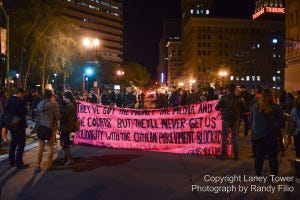“Shoot first, and…I don’t even think they ask questions later,” said Sealli Moyenda to the audience. He’s the evening’s emcee for an event entitled “Black Community Control of Police.” It’s a call to action in the aftermath of a slew of cases where police all across the United States have used, what’s speculated to be, and in cases, what’s proven to be, unjustifiable lethal force on black and brown men. The aim is to instate a community-selected committee that will have oversight of the police.
The event is aptly hosted at the Uhuru House, which “has seen a lot of action over the years,” according to Moyenda. It’s the organizing center for the Uhuru Movement, launched in the late 70’s with the commitment to liberate Africa and African people everywhere. Uhuru means “freedom” in Swahili.
“We should have the right to train them [the police], and we should have the right to fire them,” said Omali Yeshitela, the Chairman of the Uhuru Movement. “I want someone here in our community because they are looking out for us. Not just looking for trouble.”
A profound racial disparity among the victims of law enforcement shootings is revealed by data from a Center for Disease and Control and Prevention study. Black Americans, between the years 1969 and 2011, were found to be up to eight times more likely to get shot and killed by law enforcement than a white person. The average of those 40 years is that black Americans are 4.2 times more likely to die at the hands of police than white Americans. Yeshitela introduces himself as a revolutionary. He’s in his 70s, but he speaks with indistinguishable passion, not skipping a beat. He says he’s tired of people defining him as a part of a race. “I’m a part of a nation [Africa] that’s been forcibly dispersed,” he says. According to the Trans-Atlantic Slave Trade Database, 12.5 million Africans were taken to North America between 1525 and 1866.We›re the only immigrants who didn›t come looking for a better life,» he said. «We were held captive.» According to Yeshitala, the oppression continues to this day, just in a different form, as illustrated by police brutality.
Yeshitela introduces himself as a revolutionary. He’s in his 70s, but he speaks with indistinguishable passion, not skipping a beat. He says he’s tired of people defining him as a part of a race. “I’m a part of a nation [Africa] that’s been forcibly dispersed,” he says. According to the Trans-Atlantic Slave Trade Database, 12.5 million Africans were taken to North America between 1525 and 1866.We›re the only immigrants who didn›t come looking for a better life,» he said. «We were held captive.» According to Yeshitala, the oppression continues to this day, just in a different form, as illustrated by police brutality.
Just a couple weeks ago, Michael Slager, a white police officer, was charged with murder for unjustifiably shooting and killing Walter Scott, who was a black man. What is bewildering is that Officer Slager would have been a free man, with his made-up story claiming self-defense, had the video evidence not surfaced from a bystander revealing otherwise. Now most recently, is the case of Michael Gray dying at the hands of Baltimore Police. He was killed for looking at a police officer in the eye and then running away.
One of the main problems, according to Yeshitala, is that police are often not from the community they are serving. They come to communities of color looking for trouble. “If you [the police] come just looking for trouble, that’s what you’re going to find,” he said. “I want someone here because they are coming to look out for us, to love us.”
Among the evening’s speakers was Benjamin Bae Sierra, a close friend of Alex Nieto. Nieto was a 28 year-old full-scholarship student and provider for his family, working as a security guard. On March 21, 2014, he was sitting on a bench in Bernal Heights across the sunset view of Twin Peaks before his shift at work when he was struck by 15 of the total 59 shots fired at him by four officers from the San Francisco Police Department. According to the SFPD, the officers were responding to reports of a man with a gun and Nieto pointed a Taser stun gun at them. They shot him from 75 feet away.
“They said he pulled his Taser, but why would he ever have pulled his Taser out if they were so far away when Tasers just go at most 15 feet,” said Sierra. “It’s impossible to believe. We don’t even need a video camera.”
Following Sierra was Jabari Shaw, a black man and recent victim of police brutality. “We’ve got to start dreaming like MLK. We’ve got to change the system,” said Shaw. “We’re going to fight now and we’ll die if we have to.”
Most recently, in the Baltimore case, where Michael Gray had his spine severed in the custody of the police, he was detained for having eye contact with a police officer. Riots have ensued by the local Baltimore community. Many have said, “broken windows, are they worth more than his broken spine?” As MLK has said, “riots are the language of the unheard.”
Categories:
Movement Advocates for community control of police
May 1, 2015
Tags:
About the Contributor
In the fall of 2019, The Laney Tower rebranded as The Citizen and launched a new website. These stories were ported over from the old Laney Tower website, but byline metadata was lost in the port. However, many of these stories credit the authors in the text of the story. Some articles may also suffer from formatting issues. Future archival efforts may fix these issues.

























